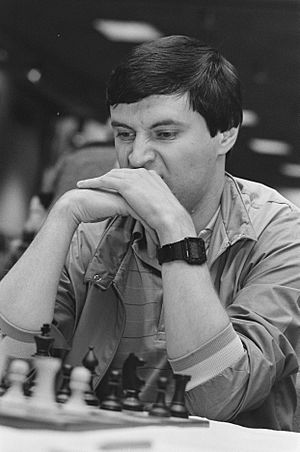Alexander Chernin facts for kids
Quick facts for kids Alexander Chernin |
|
|---|---|

Alexander Chernin in 1987
|
|
| Full name | Alexander Mikhailovich Chernin |
| Country | Soviet Union (until 1991) Hungary (since 1992) |
| Born | 6 March 1960 |
| Title | Grandmaster (1985) |
| FIDE rating | 2614 (February 2026) |
| Peak rating | 2645 (January 1998) |
| Peak ranking | No. 19 (January 1994) |
Alexander Mikhailovich Chernin (Russian: Александр Михайлович Чернин) was born on March 6, 1960. He is a famous chess player and coach. He was born in the Soviet Union but later became a citizen of Hungary. Alexander Chernin is known as a Grandmaster in chess.
Contents
Alexander Chernin's Early Chess Journey
Alexander Chernin was born in Kharkiv, which was part of the Ukrainian SSR back then. As a young player, he quickly became very good at chess. He won many tournaments and moved up the ranks fast.
Becoming a Junior Champion
In 1979, Alexander played in the World Junior Chess Championship in Skien. He finished in second place, right behind Yasser Seirawan. A short time later, in January 1980, he won the European Junior Chess Championship. This event took place in Groningen, and he finished ahead of Zurab Azmaiparashvili.
These big wins helped him earn the International Master title. They also set the stage for his future success in chess.
Winning Tournaments Around the World
Over the next few years, Alexander Chernin won many chess tournaments. Some of his victories include:
- Irkutsk in 1980
- Copenhagen in 1984 (and again in 1986, sharing the win with Vasily Smyslov)
- Stary Smokovec in 1984
- Polanica-Zdrój (Rubinstein Memorial) in 1988 (sharing with Alexander Goldin)
- Prague in 1989
- Marseille in 1990 (sharing with Evgeny Bareev)
He also took shared second places at the Cienfuegos (Capablanca Memorial) in 1981 and Reggio Emilia in 1986/87.
Reaching Grandmaster Status
The best part of Alexander Chernin's playing career happened in 1985. In that year, he achieved the highest title in chess: International Grandmaster.
Soviet Champion and World Championship Try
Also in 1985, he won the USSR Chess Championship. He shared this title with Viktor Gavrikov and Mikhail Gurevich. He also played well in the Gammarth (Tunisia) Interzonal tournament. This earned him a spot in the Montpellier Candidates Tournament. This tournament was a step towards becoming the World Champion. However, he finished in the middle of the table, so he didn't go further in the World Championship race.
Team Gold Medal Winner
In the same year, 1985, Alexander Chernin won two gold medals. He won both team and individual honors at the first-ever World Team Championship. This event was held in Luzern, where he played for the Soviet Union team.
Blitz Chess Success
In 1988, another new event took place: the World Blitz Championship. This was held in Saint John. Alexander Chernin finished tied for third place with Kiril Georgiev. Only Mikhail Tal and Rafael Vaganian finished ahead of them.
Chess Career in the 1990s
Alexander Chernin continued to play well in international competitions during the 1990s.
More Tournament Wins
He won outright at Dortmund in 1990, finishing ahead of Boris Gelfand. He also shared first/second place at Dortmund in 1991, though Igor Stohl won on a tie-break. Other successes followed:
- Buenos Aires (Najdorf Memorial) in 1992
- Gothenburg in 1996
- Aubervilliers in 1996 (this was a rapid chess event)
Moving to Hungary
In 1992, Alexander Chernin moved to Budapest. A year later, he became a citizen of Hungary. He has represented his new country many times in chess events. He played for Hungary at the Olympiads in 1994 and 1996. He also played in three European Team Chess Championships. In 1999, he won a team silver medal at one of these championships.
Alexander Chernin's Present Activities
Since the year 2000, Alexander Chernin has played chess less often. However, he still shows his skill.
Coaching and Training
In 2001, he was a joint winner of the Corsica Masters tournament. He lost to Viswanathan Anand in the final game for the champion's title. Alexander Chernin is also very involved in coaching young chess players. His most famous student is the talented Italian-American master Fabiano Caruana. In 2004, he received the title of FIDE Senior Trainer. This means he is recognized as a top chess coach.
Chess Theory and Books
Alexander Chernin is also a chess theorist. This means he studies and writes about chess strategies. He has written articles for publications like New In Chess. He is especially known for his knowledge of the Pirc Defence, which is a specific way to start a chess game. In 2001, he wrote a book about this opening called Pirc Alert! with Lev Alburt.
Notable Games
Here are some of Alexander Chernin's interesting chess games:
- Alexander Chernin vs John Van der Wiel EUCup Grp3 1997, Zukertort Opening (A04), 1–0
- Alexander Chernin vs Alexander Utnasunov FIDE World Ch 2000, Semi-Slav Defense (D45), 1–0
- Peter K Wells vs Alexander Chernin Tch-AUT −01 2000, Benko Gambit: Accepted. (A57), 0–1
 | Stephanie Wilson |
 | Charles Bolden |
 | Ronald McNair |
 | Frederick D. Gregory |

